The sound of music: Trio of women organists have blessed rural church for many Easters
ERICKSDAHL COMMUNITY — Easter is about blessing, and Bethel Lutheran Church has been blessed with the sound of keyboard music for much of its existence.
The stone church that rises majestically from the cotton field east of Stamford in Jones County was built between 1932 and 1941.
The church is about 40 miles north of Abilene.
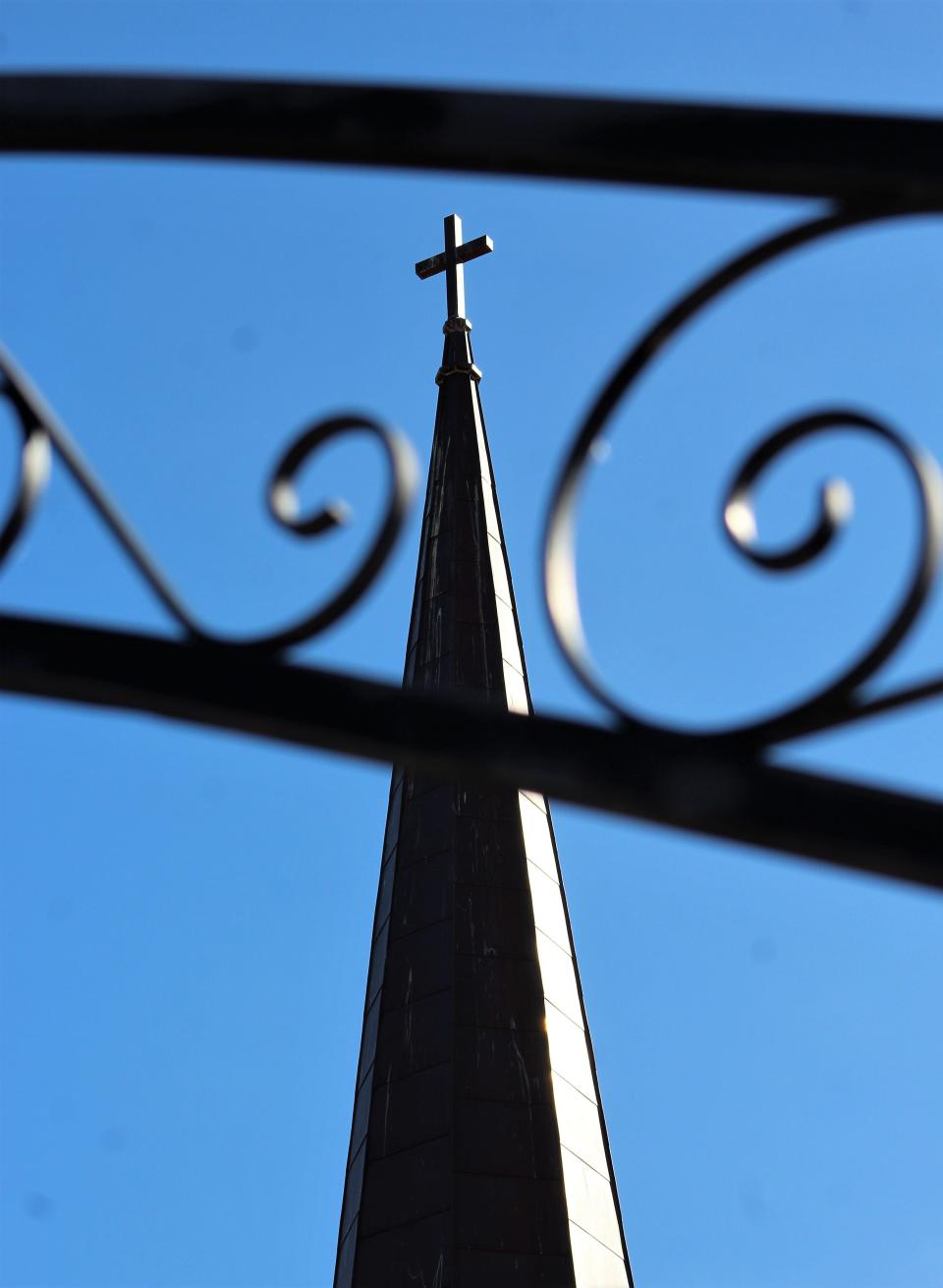
For 51 years, Addie Haterius was the organist.
Today, her granddaughter, Suzanne Haterius Fusaro plays both for the early service in Stamford, at Bethel Christ Lutheran, and then at the 11 a.m. service at Bethel Lutheran, a drive of 11 or 12 miles, depending which of two routes you take.
Time in between for a doughnut or cup of coffee.
Fusaro sets up on the west side of the church, in an alcove that once was for choir. The organ is there, and the piano is opposite the podium at which pastor Richard Strait delivers his sermon.
He also is the minister for the Stamford service.
"Many years ago, we kind of combined efforts," Fusaro said of the necessity of double duty.
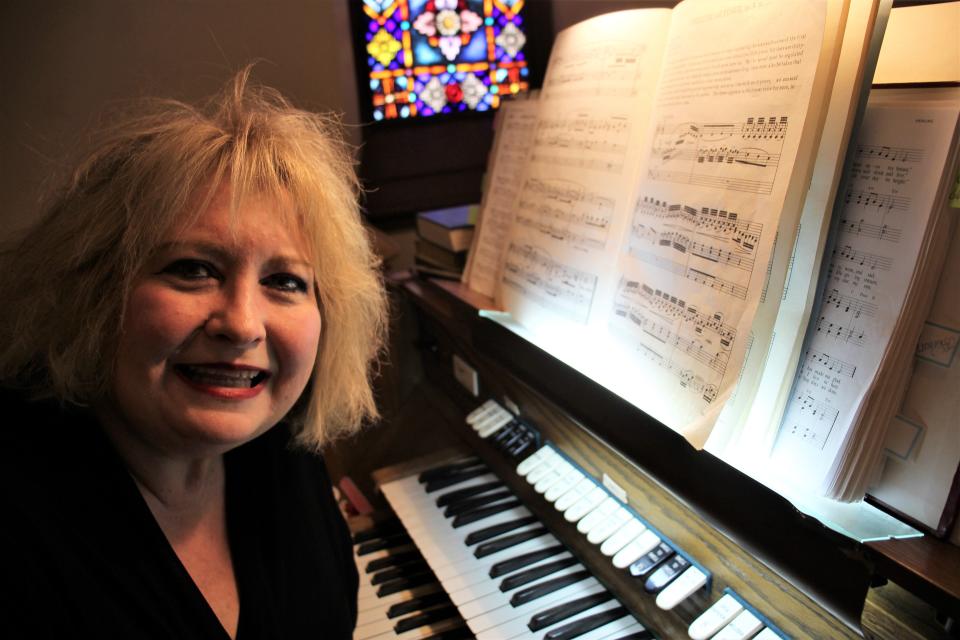
After listening March 27 to Strait's sermon, which was based on the story of the prodigal son, Fusaro choose to play "Amazing Grace" on the piano during the offertory.
"It's what I have done for years," said Fusaro, who did the same for 20 years at her church in Fort Worth, before she returned to Jones County. "There's usually something in a sermon that will trigger a line from a hymn."
This day, the topic of being lost and found brought to mind "I once was lost, but now am found. Was blind but now I see."
"You have people who will say, 'The whole service fit together so well,'" she said. "If I was so rigid that I had everything completely laid out, it doesn't give the Holy Spirit much room to work."
Selecting "Amazing Grace" hardly was a stretch. She said a former pastor purposely would add an obscure hymn reference to his sermon just to see if she picked up on it for her musical selection.
Whoever said pastors were all work and no play?
It began with her grandmother

Haterius was Fusaro's grandmother. Like her, Fusaro has given decades to the organ. This is her 48th year.
Between the two women, that's almost 100 years of faithful service to congregations.
"Music so often touches parts of us ... we can hear a song that we haven't heard in years and it will remind us of a relative, a moment, a special time. It evokes emotion. It's so important for us to embrace the music in our lives."
Last Christmas Eve, she was stepping into what she calls the "organ loft," which slightly raised from the sanctuary floor.
"I saw the worn place on the wood floor and on the bench and I thought of how many times Mamma (her grandmother, pronounced "mam-maw") slid onto that organ bench and how Becky (Nauert, another longtime church organist) slid onto that bench and how honored I am to get to get to be one of those folks who served out here."
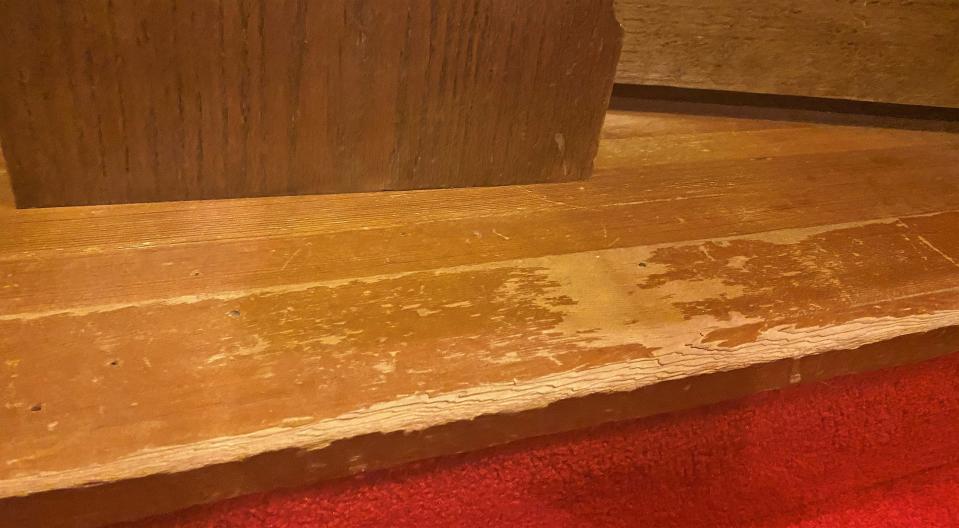
Addie was the wife of Dr. Hugo B. Haterius, Fusaro's grandfather, who accepted a call to minister at Bethel in 1919.
She had a degree in music, attained in 1912 from Bethany College in Kansas, where they met.
At the time, the church was a small, white, wooden building.
"My grandmother was from the city, so I am sure this was quite a departure for her," Fusaro said. Addie Haterius had grown up in Grace Lutheran in Fort Worth.
For example, she asked where the trees were. Her husband said what few mesquites there were represented her orchard.
Pastor Haterius retired in 1968 after serving for 49 years. He died in 1970.
Fusaro began taking piano lessons in 1971, after her grandmother had retired from playing but not from her.
Two years later, her teacher told her, "Next week, we're going to start on the organ."
The young student responded, "I don't really want to play the organ."
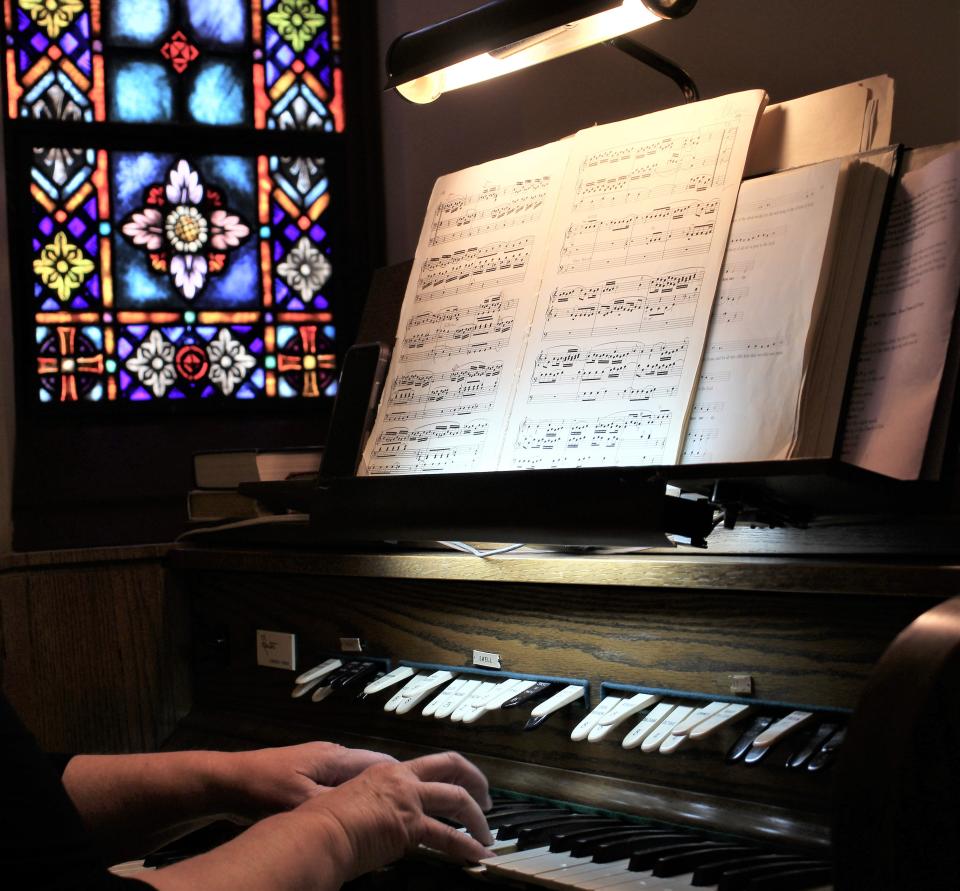
The teacher responded to that, "Well, you're going to."
"There was no discussion," Fusaro said, laughing. "I am so very, very thankful that happened."
Except for a year, maybe two, there always has been a church that needed a musician, she said.
There are not enough organists to go around these days, certainly not good ones. The ones with talent and desire go to the larger churches, she said..
"It's an honor for me to get to carry on that tradition," said Fusaro, who became the church's organist in October 2019.
Becky Nauert succeeded Addie Haterius at Bethel Lutheran. She played for about 40 years.
Between Nauert and Fusaro, the church had only a pianist, Sherry Dou, a blind music student from Hardin-Simmons University whose mother drove her to Bethel Lutheran for Sunday services.
More: Country church's investment in blind pianist pays off
Carrying on the family tradition

It was Nauert who suggested (prodded) Fusaro to play the organ for the evening service. She also encouraged Taimi Wendeborn, who still plays the piano at the church.
The girls, who were junior high age at the time, agreed but played as a duet.
"She would play the left hand and I would play the right," Fusaro said. "Or we would switch. Neither of us played the whole thing. "
Birger Haterius, her uncle, was a vocalist at the church for years. Mamma accompanied him, but one day, both decided it was time for Fusaro to do that.
"It was like having the torch passed. It was always so special to play for him," she said. "Under mamma's supervision."
Every Easter, he would sing "Art Thou the Christ."
"It's one of the most moving pieces of music, both to play and to hear him sing. I still to this day, if I play it, I get emotional," she said.
Fusaro would move away and not return home for about 40 years, she said.
She went to college at Midwestern in Wichita Falls, playing at Trinity Lutheran there. Then came a time at a Methodist church in Bowie, which is about halfway between Wichita Falls and Forth Worth. In 1990, she moved to the Fort Worth-Dallas area and began playing at Christ the King Lutheran in Haltom City. She was there for 28 years.
She did not make these moves as an organist for hire. Her weekday jobs included corporate and nonprofit event planning.
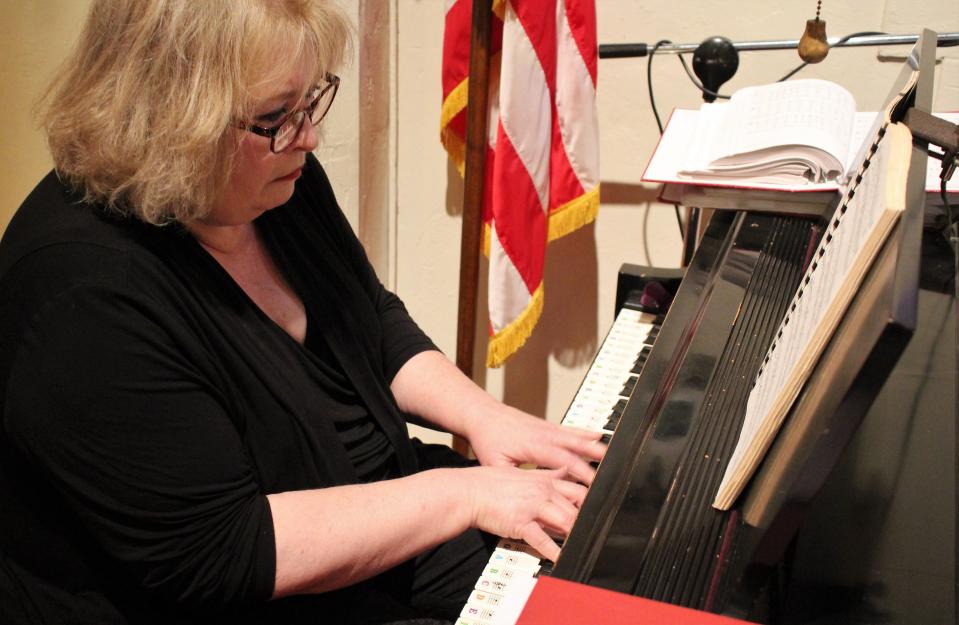
Returning home
In summer 2019, Fusaro returned to the old home place to operate the Grand Theatre in Stamford. Her husband, Lou died in 2008 from leukemia.
"I had always wanted to be back home," Fusaro said.
Through the years, she had been back to play at Bethel. Mostly for special events - weddings, funerals and the 100th anniversary of the church, which was founded in 1906.
Her job at the movie theater on the square didn't last long. That July, she broke her leg in two places during its showing of "The Lion King." She couldn't go up and down stairs.
"Now what do I do?" she wondered.
A friend asked her to teach her granddaughters the piano.
"But," Fusaro said, "I don't teach piano.
The friend said, 'Well, you have until September to figure it out.'"
And that's what she does, along with flute (she was in the Stamford band, playing that instrument and the piccolo, and serving as drum major) and voice at her home studio.
Most students are from Stamford but she has one from Rule and another from Haskell.
"It's encouraging to see that kids are interested in playing the piano," she said. "I spent so much of my life playing the piano. You hate to think that, too, might be a dying art."
The turning point
Playing has followed the Haterius line. Fusaro's mother did not play but sang, she said.
"She endured many, many hours of listening to me," Fusaro said, laughing.
What separated hobby from vocation came, she said, the summer of 1972.
The summer of Watergate.
"I was too young to work and there was nothing on television after 'The Young and the Restless,'" she said. The break-in and aftermath dominated the news.
"I would spend hours and hours playing playing some complex pieces," she said.
One that she learned she had heard on her favorite daytime soap opera.
Her teacher identified it as Rachmaninoff's "Prelude in C Sharp Minor."
"'It's in one of your books.' So I got it out and I worked and I worked and I worked all summer," Fusaro said.
She played it for her teacher when lessons resumed that fall, and she told the teenager, "You're not the same pianist as the one who left here. What you have done this summer has changed you in many ways."
She admitted that as a pianost, she lacked great appreciation for Bach but discovered his music has greater appeal on organ and harpsichord.
Worshipful for her
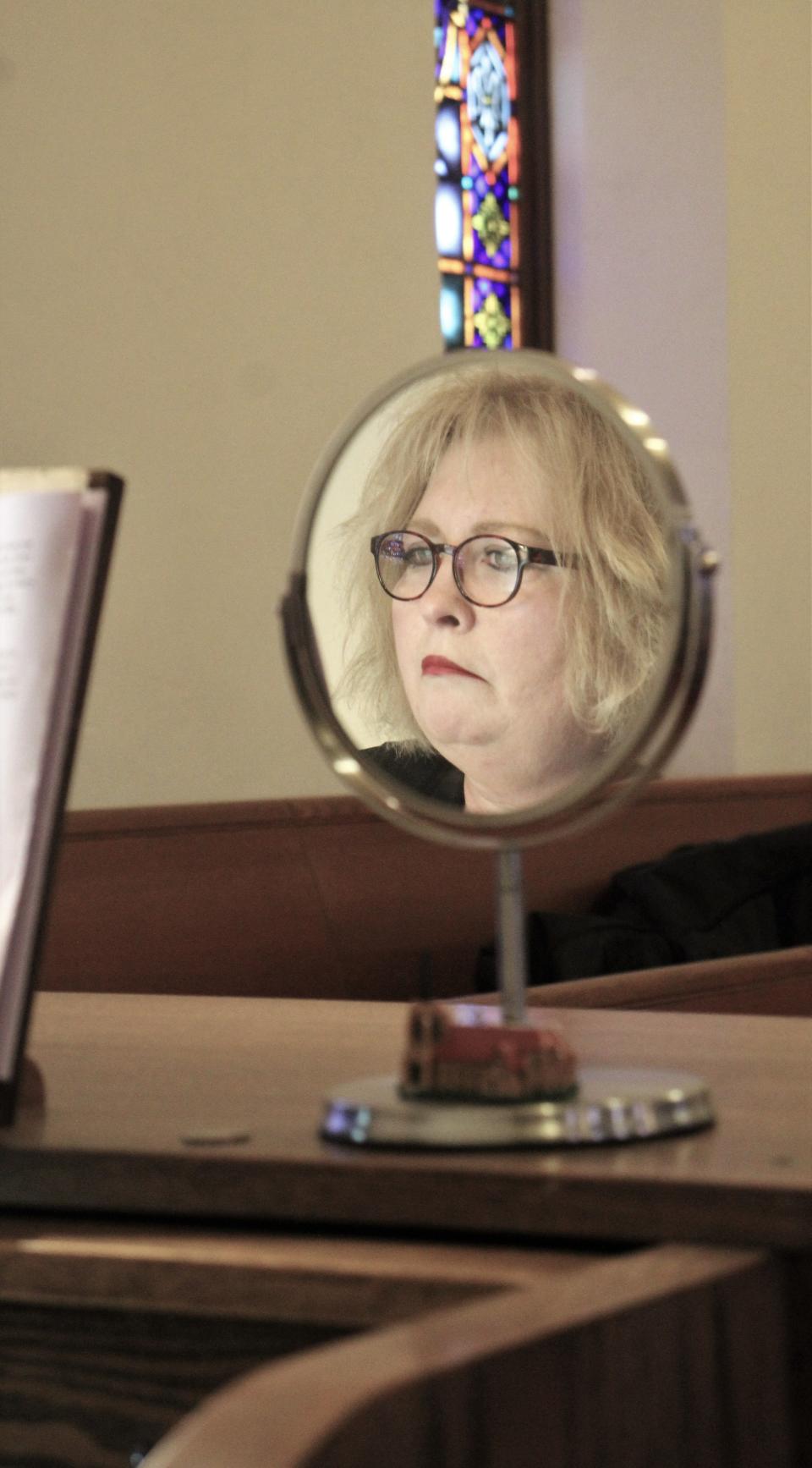
Fusaro said that despite paying attention to her role during services, she worships. If something in a sermon touches her and inspires her music selection, she believes worshipers are equally touched.
Recently, she has played "Let There Be Peace on Earth" as the war situation in Ukraine escalated. She went to her sheet music source and found the Ukranian national anthem and has played that. It's less than 2 minutes in length and, unlike the rousing U.S. anthem, more hymn-like and fitting for a church service prelude or postlude.
"People will say, 'That's so appropriate,'" she said. It's why she brings a stack of music with her to church, giving her a wide variety of music to choose from when the inspiration comes.
"Pulling those things into the worship experience," Fusaro said.
Strait chooses the hymns for the service, she said. He most often follows the Lutheran church season in his selections.
In that way, the readings and hymns match.
But there are times that she suggests a hymn based her take of the subject.

Seeing is bee-lieving
The pipes are in a loft above the organ. The grating emitting the sound can be seen, opening wider for crescendos and such.
The notes began to stick, she said, likely because Dou was the pianist at the time.
"It hadn't been used a whole lot," Fusaro said.
"When they went up to check, they found we had Bethel bees. They had made hives and honey up there," she said.
"Which is quite a mess."
They were next door in the parsonage, too, using Santa's old trick to get inside - down through the chimney.
Interestingly, the Bethel bees shaped their hives like the pipes - vertically, like formations in a cave.
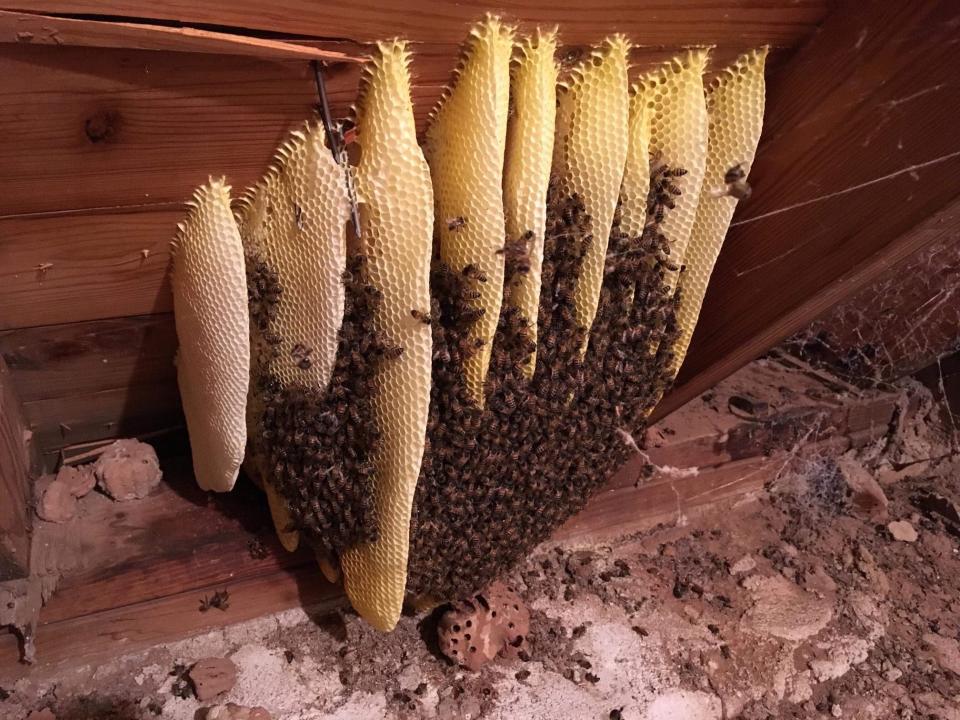
"They were influence by their surrounding," Fusaro said.
"Who are you gonna call? Beebusters," she said, laughing. It did take expertise to remove the bees.
Bees have been around. She recalled bees landing on her music when she played the organ during high school.
"I'd try to blow them off because I didn't want them to sting me but I wanted them to move," she said.
But maybe not leave. After all, occupying a church, they would seem to be bee-lievers.
Her special place
Fusaro's daughter - Addie, named for Addie Haterius - doesn't play.
"We tried," she said. "I think a mother teaching a child piano is not always successful."
She does play bass clarinet.
Fusaro has a granddaughter, who just turned 1. It's still to be determined what musical course Amelia Goss will take.
Steven and Addie and Amelia lived in North Richland Hills, near Fort Worth.
All total, five generations of Hateriuses have been a part of Bethel Lutheran. The Richards family, Fusaro noted, boasts six generations.
That history, in part, inspires her role as organist.
Strait's wife, Renee, is a cousin (her mother was a Haterius).
She lived in the parsonage, the same one that Fusaro's grandfather and grandmother once occupied.
"It's just really special," Fusaro said.
Easter celebration

Easter, too, will be special at the church.
Some churches follow what is called the triddum — the three holy days of Easter beginning with Maundy Thursday and Good Friday. Thus, some churches begin the Easter service in silence, others with sunrise services to accentuate the passage of darkness to light.
That has been Fusaro's experience elsewhere.
She was considering beginning with "Jesu, Joy of Man's Desire." By Bach, of course.
"My postlude is always the 'Hallelujah Chorus,'" she said. "We will sing "Jesus Christ Has Risen Today" or "Christ the Lord Is Risen Today,' whichever version Richard chooses.
"At some point I'll play 'Because He Lives,' whether we sing or I play during communion," she said. The Bethel congregation takes communion the first and third Sundays.
"On a high Sunday celebration we would have it anyway," she said.
She will look at "Alleluia" songs because those are not sung during Lent.
Fusaro thus is greatly involved in Sunday's worship. She wouldn't have it any other way.
"I used to read these tributes to organists that had been someplace 50 or 75 years, and I when I was a child I'd think, 'Oh my goodness, how does somebody do that that long? Now, when do you say, 'No, God, I'm through. Thank you for the talent ... so you just keep going.
"I found I'm not so good at sitting in the pew because I have been so much a part of the service."
Greg Jaklewicz is editor of the Abilene Reporter-News and general columnist. If you appreciate locally driven news, you can support local journalists with a digital subscription to ReporterNews.com.

This article originally appeared on Abilene Reporter-News: Women organists have blessed rural church for many Easters
